The Taliban Are Who We Thought They Were
The notion of a kinder, gentler version has quickly been debunked.
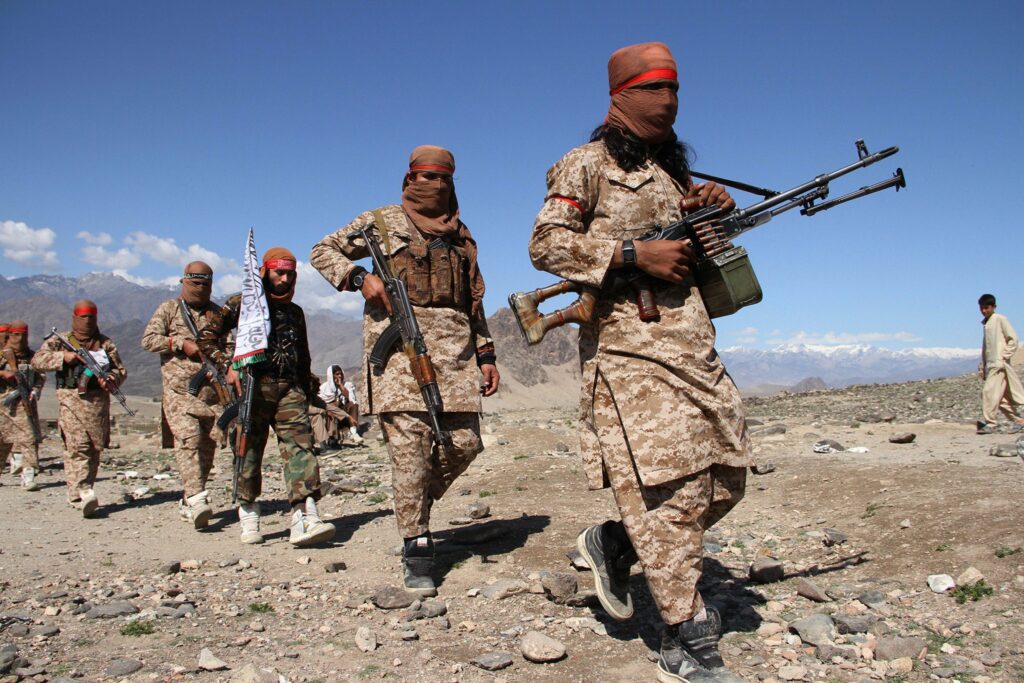
NYT (“Taliban Fighters Crush a Women’s Protest Amid Flickers of Resistance“):
Taliban fighters violently suppressed a women’s protest Saturday in Kabul, while 70 miles to the north ex-Afghan army and militia members battled the Islamist group in Panjshir Province, as pockets of anti-Taliban resistance continued to flare up.
Several of the women, who were demanding inclusion in the yet-to-be named Taliban government, said they were beaten by Taliban fighters — some of the first concrete evidence of harsh treatment of women by the group.
Since they swept to power last month the Taliban leaders have been on a “charm offensive” seeking to convince the world, aid groups and their own population that the harsh rule they imposed in their last stint in power, from 1996 to 2001, was a thing of the past. But there was little restraint in evidence at the Kabul protest.
A 24-year-old participant said in a telephone interview that the Taliban tried to rout the gathering of about 100 women using tear gas, rifle butts and metal clubs or tools. She said she received five stitches to close a head wound after she was knocked unconscious with a blow from one of the metal objects.
“When I tried to resist and continue the march, one of the armed Taliban pushed me and hit me with a sharp metal device,” said the woman, who the Times is identifying only by her first name, Nargis, to guard against retribution.
“They pushed everybody away and forced us to leave while chasing us with their spray, weapons and metal devices,” said Nargis. “The Taliban kept cursing, using abusive language.” Video of the incident on Afghan news media outlets showed a bearded Taliban member, surrounded by gunmen, exhorting the women to disperse through a megaphone, which was then snatched from his hand by one of the women.
This should surprise no one. Twenty years of relative openness will make enforcing their extremist view of Sharia more difficult this time around. But they may simply induce them to greater levels of brutality.

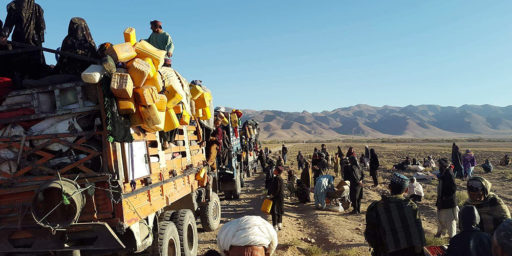

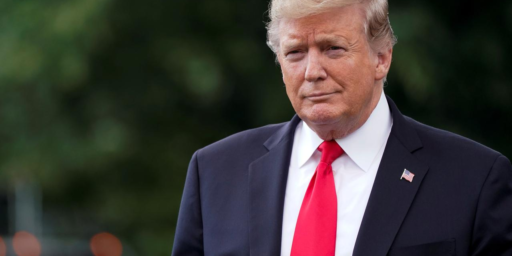
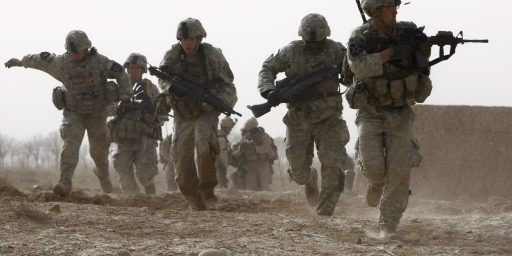
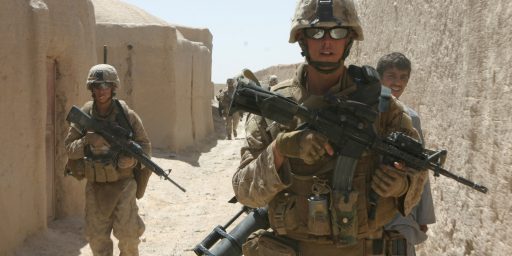
On a possibly tangent to the subject of your post, James, why do people in the U. S. seem to assume that the Taliban are lacking in popular support? I suspect that Deobandi Islamism probably reflects a majority view in Afghanistan.
@David Schuler:
I’ve never seen a poll about whether Americans believe that or not.
I don’t see *the taliban* as a single entity any more than I see Afghanistan as a cohesive country. It seems like bullies ruling bullies, each looking out for his own misogynistic goals while trying to avoid getting on the bad side of higher ranking bullies.
@David Schuler:
Probably from anecdotal evidence that has been reported in the press. The source of which was mostly middle and upper class Afghani’s from the urban areas. Again anecdotally, it seems that the Taliban’s concept of social order is and was how rural Afghani’s have lived anyway, but without the forced consistency that the Taliban have displayed. For instance, rural village leaders might shrug their shoulders, but criticize a woman who refuses to veil, essentially saying Ah Aabish, she’s a trollop from a long line of trollops, while the Taliban will beat her.
@EdB: “It seems like bullies ruling bullies, each looking out for his own misogynistic goals while trying to avoid getting on the bad side of higher ranking bullies.”
Oh, so basically today’s Republican party…
The taliban are just like our good friends the Saudis
The Saudis taught the taliban how to practice sharia law
I read an essay by a woman who lived and worked in Afghanistan for 10 years, who explained that the Talibs were a creation of the Pakistanis, and exported to Afghanistan (as opposed to something native to it).
I haven’t been able to find independent confirmation of this so I can’t say for certain it is true.
I’m not surprised, but most of all struck by how the Taliban conduct here – breaking up a political protest with aggressive use of less-lethal violence – sounds like the SOP for many US police departments.
Were any of the women blinded? During the BLM protests US police partially blinded at least 8 protesters in a single day, May 30 (source: WaPo)
I’m not excusing the Taliban for a second, but if people are troubled by this kind of regime conduct let’s maybe clean our own house before committing to spreading – at the point of a Hellfire – more of our own brand of freedom overseas.
https://www.usatoday.com/in-depth/news/nation/2020/07/24/rubber-bullets-less-lethal-weapons-victims-police-protesters-decades/5410519002/
Too early to tell. They appear to be trying to sort out what they want to be, and in the meanwhile, what happens can easily be the result of some local chief. Also, they shot in the air and didn’t detain anyone. The old Talibs would have grabbed some of them for a public flogging.
Some news about the sorting out. Seems the head of the ISI has paid a visit to the meetings. https://apnews.com/article/taliban-special-forces-1fa9a87c8fde6e7c947944212bb80241
This Taliban has far more literate people to deal with and at least some of the leadership appear to hold the opinion prosperity matters and is not simply a matter of turtling up and raising goats. As much as we like to think our occupation was an utter failure it appears we did change something about the place. The way their young city folk think doesn’t appear to be the same.
@David Schuler:
Because:
1 – The Taliban coalition are Deobandi Sunni, the Hazara are Shia, so there’s 10% of the population unlikely to be fans from the outset
2 – The Taliban coalition are Pushtun, and in a lot of instances at least as keen on pushtunwalia and the dominance of the Pushtun as on Islamic principles. Which tends to annoy the non-Pushtun 60% of the population.
3 – The Taliban are Deobandi Sunni; what percentage of the Sunni Afghans would consider the Deobandi tradition as the correct is unclear.
3 – The Taliban are Sunni; so are 85% of the population. But I have met Sunni Afghans who regard the Taliban’s self-appointed status as the guardians and enforcers of Islam to be presumptuous in the extreme.
4 – It may represent a popular majority; they could always have a vote on it?
Oh, silly me, I forgot that imposing Western concepts of popular consent on Islamic societies is wrong.
My bad.
@dazedandconfused:
The ISI really don’t want the pooch to get screwed again this time around the block.
“If you want to kill them, make sure you do it off camera. Otherwise, sanctions mean no aid dollars for you, OK?”
@Chip Daniels:
The Talibs were sponsored (note, not fully controlled) by ISI from the outset.
The became the favoured party of Islamabad after Gulbuddin Hekmatyar’s Hezb-e-Islami, their previous proxies, failed to take Kabul from the majuaheddin coalition in 1994, and ISI and Hekmatyar fell out.
This report by Human Rights Watch from 2001 is a pretty fair basic summary.
@John L Ryan:
Saudis (and by extension, Al-Qaeda) are Salafi, subset Wahhabi, Taliban are Hanafi, subset Deobandi.
Another factor: Saudis are Arabs, and Arabian Arabs at that; and often not shy of expressing an Arabic chauvinism that annoys other Muslims.
One reason, beside the Sunni-Shia discords, that Iranians and Arabs get on each others nerves.
And why Egyptians, though Arabs, often view Arabians as a bunch of backward camel herders who got lucky by having an ocean of oil under their tents.
I was told we are not allowed to criticize Islamic culture. Not honor killings or women forced to wear burkas against their will. Then we learn that liberal NGOs were for 20 years angering Islamists by teaching girls and women, etc. There’s a Tik Tok of some female westerner teacher, likely British, trying to explain some urinal piece of art to Afghani students.
Guess these teachers didn’t want to follow the advice of some old white guy who successfully formed a new nation
Right now a lot of Afghan women could use some training in how to handle a weapon and kill religious extremists more than how to parrot sentiments about modern art.
@JKB:
Adams didn’t really create a nation, though did he?
He, and the other founders, worked with what was already there..
And there were some serious problems with that, as far as national unity went.
See the events of 1861 and after.
And it seems quite a few right wing Americans are themselves rather keen on telling women what they can and cannot do, in Texas.
As to Islamic culture, contrary to your rather limited understanding, a lot of the women (and men) concerned happen to regard themselves as Muslims. And despise the Taliban anointing themselves as the arbiters of Islam.
And when it comes to women handling weapons:
And those Kurdish women were quite often Muslims, or socialists, or both.
And more balls than you’ll ever have.
@JKB:
@JohnSF:
And what did you glorious leader do to those Kurdish women?
Betrayed them without a moments hesitation.
But don’t feel too bad.
A lot of your political opponents would betray them too, and be just as smug as you are about it.
As long as you, or they, can bash the other side of the American political divide, what are the lives of these little people beside your, and their, self righteousness?
@David Schuler: Yes, indeed. Western media has a terrible problem when reporting in these regions. The Journos really strongly tend to convey as The Population X View of whatever the view of anglo or francophone urban elites. I see it all the time in my home territories – and often know exactly the persons the journos are talking to so it feels quite strange to then see Fulan or Fulana reported as man-on-the-street views….
Even the protest, which I caught the clips on France 24… those were painfully obviously elite women, the fancy urban ladies. Of course they have their right to protest but taking them naively as The Afghan Women protesting is a bit of naiveté that is self-decieving, particularly missing domestic impact where such protest may equally be parsed as ‘Rich Priviledged Ladies showing off’ or Westernized Priviledged or “that class of people who’s done well and we resent.”
Naively parsing events via “Women protests” only is rather a way to continue to misunderstand the whys of the American & NATO failure.
@Sleeping Dog: Yes they are essentially a rural reactionary movement and it’s basically hillbilly Pashtun culture (specifically not merely Afghan).
@Chip Daniels: no, they were backed but they are not a creation of the Pakistanis. That’s over-simplifiying self-deception on the author’s part if she said something like that.
@John L Ryan: No, the Saudis did not. That is a profoundly ignorant statement.
@JKB: Since you know f-all about “Islamic culture” you shouldn’t make any attempts to criticize it, being an ignoramus. Honour killings for one are a tribal thing and very heavily a South Asia cultural artefact (as well as Middle Eastern) across religions (and entirely unknown in the traditions of the Maghreb, with its Berber cultural underlay).
@JohnSF: Salafi is not a sect, it is an approach. Like “evangelical.” One can have Salafist – or Sufi – from any of the major Sunni schools (Maleki, Hanbali, Hanafi, Shafia). Or to an extent Shia, although hard to imagine reconciling Twelver Shi’ism with Salafist principals, as one runs into ‘evanglenical Catholics’….
The school that Wahhabism was rooted in is Hanbali.
Deobandi can certainly turn Salafist or reconcile with Salafist views. It would not strike me as incorrect to call the Taleban elite to be Salafist infused Deobandi different than old school Deobandi.
@JohnSF: It is worth noting that while not the numerical majority – at 40 odd percent they are the single largest ethnicity and the historically – since 18th century – dominant. And due to old historical central government ‘plantations’ of Pashtun, have a presence scattered throughout. Making quite the stew…
However, the pretension about voting is empty posturing – the Taleban won as the Least Bad option on the ground from the point of view of most of the population, as compared the foreigner’s regime. The utter failure of the Potemkin regime the US and NATO set up, while not a vote, is market evidence of relative buy-in.
Perhaps an organically rooted oppostion can build up now.
@dazedandconfused: It is to retain that the last time the Taleban came to power, it was at the end of a massively destructive civil-war intra-mujahidine civil war follow-on to the anti-Sov fight. There wasn’t much urban economy or anything really functioning.
It may be that the rapid collapse of the Ghani regime and the lack of urban fighting (generally) tied to the pay-off approach may be a blessing in disguise as
(1) It has left the Taleban with some aspects of a semi-modern if dependency economy (which operates on transfusions of foreign aide, so one really shouldn’t be patting oneself on the back, it’s not organic)
(2) It has left more or less educated urbanites alive with their assets largely intact,
(3) It occured it appears in part via a strategy backed by the relative moderates among the Taleban, which has handed power over. This may (but might not) strengthen the pragmatic, relative moderate hands.
It is also worth noting that good portions of the Taleban leadership have resided in Qatar over the past decade, and by which have had exposure to things that the old Taleban leadership of the early 1990s never did.
@Lounsbury:
I’ll defer to your expertise on the schools of Islam; my limited knowledge is based mainly on what I’ve picked up when looking at the history of British dominance in India and the Middle East, and the European interactions with Islam in medieval times, plus general news over the past couple of decades.
A specialist I am not.
@Sleeping Dog:
The old Talibs roughed up city and town women but left the Pashtun mountain women alone. Pashtunwali trumps Islam and those mountain people fight.
I wouldn’t say the Pashtun mountain tribes supported the Taliban so much as they tolerated them. The fine points of Islamic schools of thought are lost on them, they are mostly interested in survival. They want to be left alone aside from things like dentists and blue pills. The Taliban provided the one thing they kinda liked, circuit judges which settled petty squabbles between clans effectively. Aside from that they left those folks be. The Taliban enforced a lot of peace in a place rife with petty feuds. More than their old government ever did.
@JKB:
No one told you that.
And?
I can’t find any such video. I’d search harder for it, but I you really don’t have a point, so why make the effort.
Oh, I see your point now. If you find a tiktok of someone teaching art, it must mean none of the other subjects are being taught. It’s similar to how everytime I watch a cooking video I burn a book on history.
Man, if one tiktok video got under your skin that much, I can’t fathom how you’ll react to something that’s actually controversial.